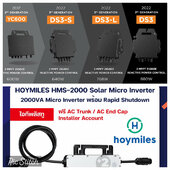I’m building a 10000w dc solar system for my home ( my city approved me for 8000w ac) I will be using 20-500w solar panels. I had a guy quote me on 10- Ap system micro-inverter (DS3-L) which only produce 768w when two panels are connected to them. Is this 768w panels in AC current or DC? I asked him You are selling me 2- 500w panels and AP system micro-inverters when these panels could produce potentially 1000w under ideal conditions. I also presented him the option of Hoymiles 2000w (see attached picture) . He said “short answer is yes I can get the 2000 W inverter. You could also use the 880 W AP Systems inverter “ your system will never output 2000 W on one inverter due to the orientation, Even for 500 W modules facing due south, on a 2000 W inverter would not get to 100% output”
My question is are micro-rated in AC power or DC? And is going with a bigger micro-inverters a waste of money? . Because Maybe a couple time a year those 1000w of panels could push out 940w at peak. Why not have the extra watt room? Or Is it just a waste of money because it’s will never be optimal?
My question is are micro-rated in AC power or DC? And is going with a bigger micro-inverters a waste of money? . Because Maybe a couple time a year those 1000w of panels could push out 940w at peak. Why not have the extra watt room? Or Is it just a waste of money because it’s will never be optimal?



